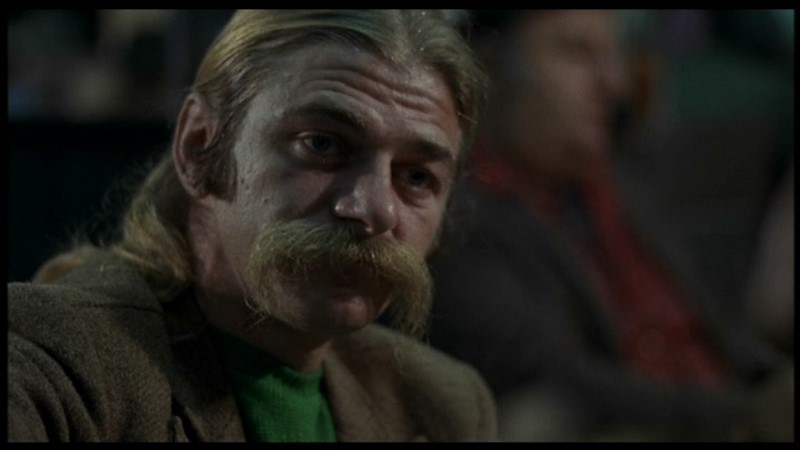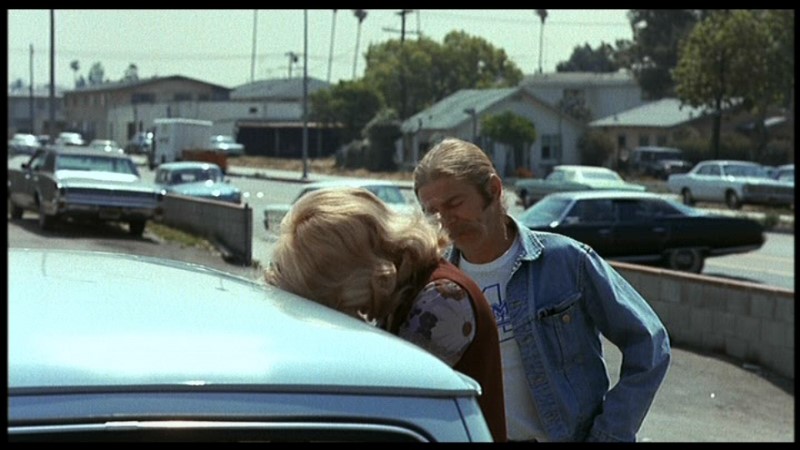|
Genres, Themes, Actors, and Directors:
- Cross-Class Romance
- Gena Rowlands Films
- John Cassavetes Films
- Misfits
- Obsessive Love
- Romantic Comedy
- Seymour Cassel Films
Review:
Cassavetes’ contribution to the ubiquitous “misfits in love” genre isn’t particularly original, but features all the best elements of this iconoclastic director’s signature style: powerhouse performances by believably natural actors, excellent use of local settings, and plenty of unexpectedly zany moments. It’s lighter in tone than his heavier works (i.e., A Woman Under the Influence, also starring Rowlands), and is probably one of his most accessible films. Unfortunately, however, Minnie and Moskowitz suffers from an irredeemably schizophrenic attitude towards its characters: as soon as we start to like someone, he or she acts horribly and loses our sympathy. Seymour’s obsessive love for Minnie, for instance, is cute at first, but quickly becomes discomfiting as he stalks her and literally forces her into his car. This is someone we’re supposed to root for? And while Seymour’s mother (played with appropriately batty energy by Cassavetes’ real-life mother, Katherine) comes across as a harmlessly doting Jewish mother in her brief debut towards the beginning of the film, she unaccountably turns against her own son during a later dinner scene. Plus, these folks yell and beat up on each other like there’s no tomorrow — then quickly (and inexplicably) forgive each other. Ultimately, Minnie and Moskowitz makes for uneven viewing: you want to care about these characters (and in a way, you do), but at the same time you’re shaking your head in concern and disbelief, and feeling grateful that they’re not part of your immediate circle of friends.
Redeeming Qualities and Moments:
- Seymour Cassel’s no-holds-barred performance as the love-struck “Seymour”

- Gena Rowlands as the confused yet lovely Minnie

- Good use of Los Angeles locales and streets

Must See?
No, but fans of Cassavetes’ work will certainly want to check it out.
Links:
|
One thought on “Minnie and Moskowitz (1971)”
Not a must.
Cassavetes’ filmmaking career is undoubtedly one of the oddest (as well as one of the most unique) in cinema history. He made some intriguing films that work on their own terms: ‘Faces’, ‘Husbands’, ‘A Woman Under the Influence’, and perhaps my favorite ‘The Killing of a Chinese Bookie’. He also made one wildly successful winner of a ‘mainstream’ film, ‘Gloria’.
And he made a few other…less successful ones. Like ‘M&M’. I’ve seen it a few times – and it just doesn’t work. For some reason, some people think it’s screamingly funny: the idea being, I suppose, that Cassavetes is allegedly making some statement about crazy love still being love and that, when you really love, you love ‘warts and all’.
That may be. But there are some HUGE warts leaping and bouncing off walls all around inside this pic. Each time I’ve seen it, I’ve lost count of the mood swings. It’s like ‘Who’s Afraid of Virginia Woolf?’ meets ‘Love Story’.
It’s simply too much when that much logic goes flying out the nearest window.
There is one fascinating sequence in the film’s subplot. Rowlands has been carrying on with a married man (Cassavetes). He goes home to his family after spending the night with Rowlands. Watch his wife.
The penultimate scene, in which Rowlands and Cassel have dinner with their mothers, seems to indicate that moms have the largest influence over children – and that, if you want to understand the adult, look to the mother. Would that be in the case of absentee dads?
It’s an irritating film. Hard to sit through, hard to like, hard to get a grip on for large stretches of time. Even Cassavetes fans (and I’m one) can have their patience pushed here.